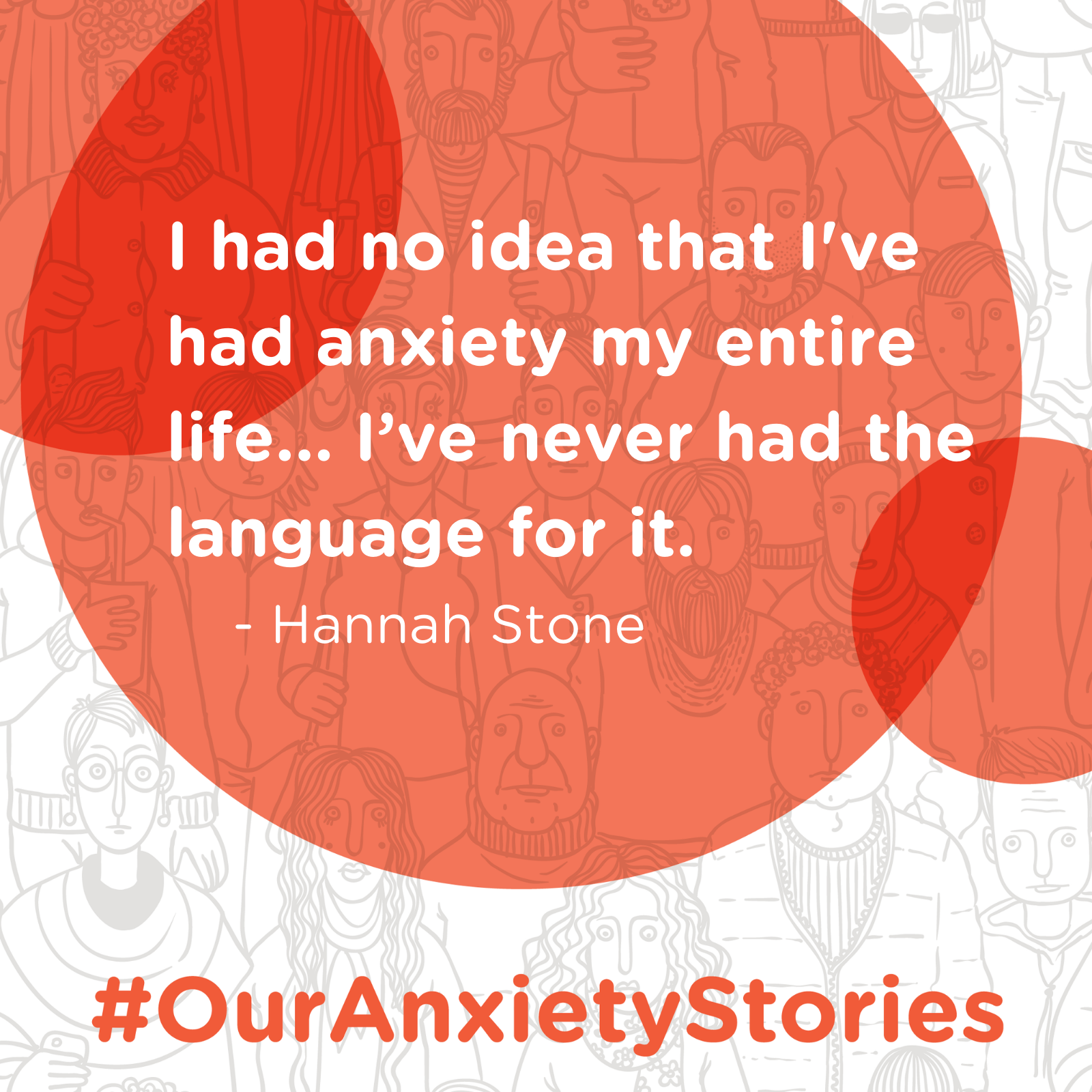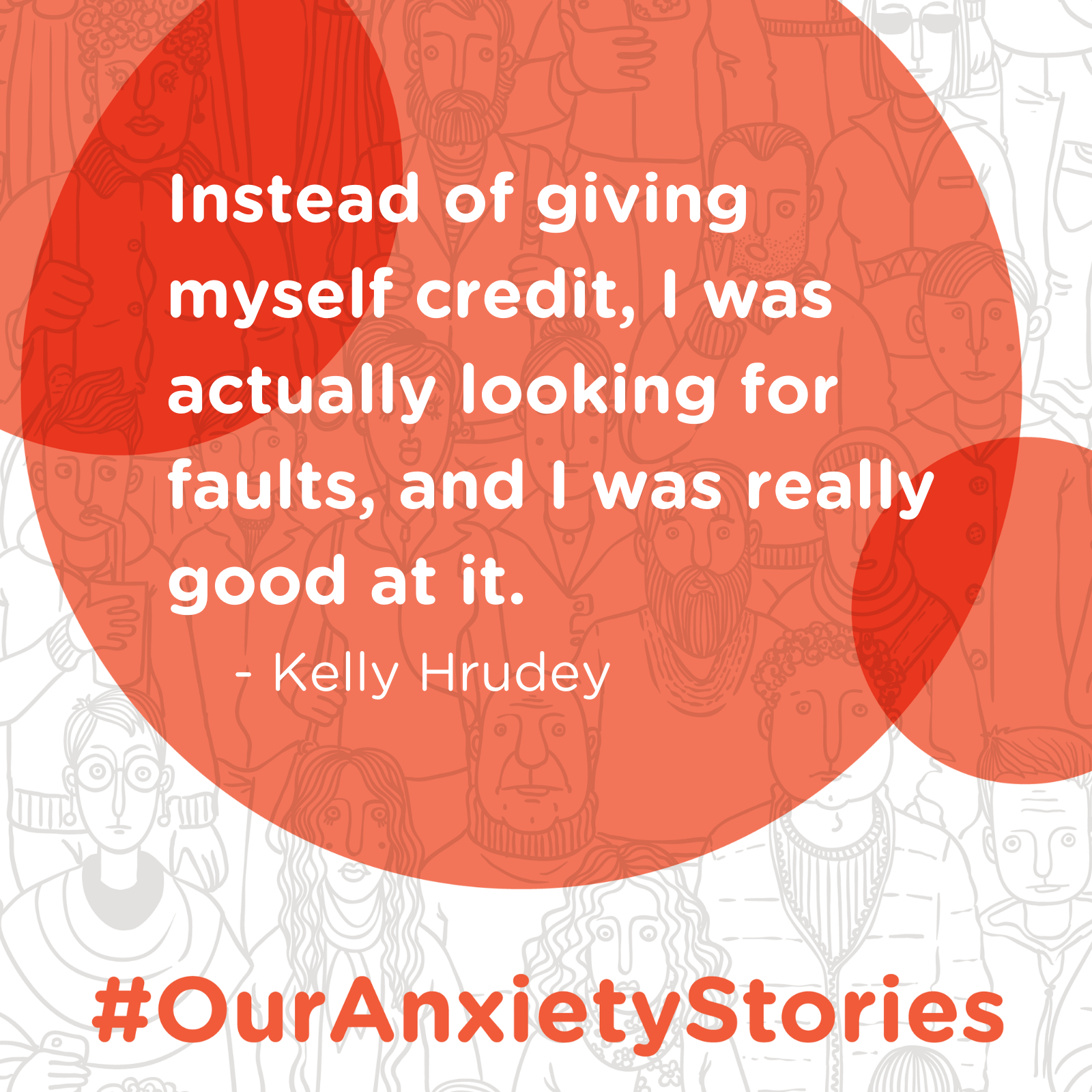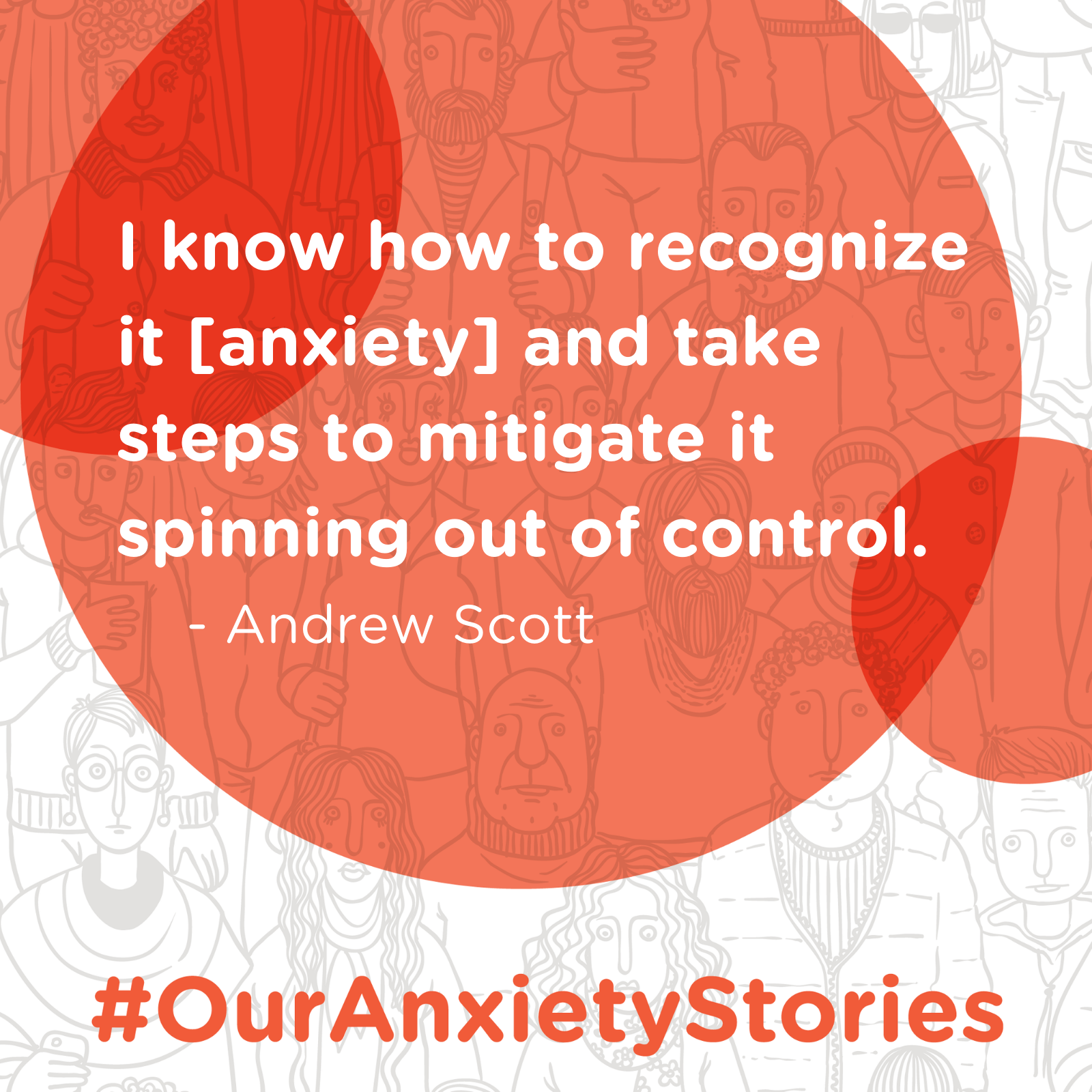Episode Transcript
Speaker 1 00:02 <inaudible>.
Speaker 0 00:08 You are listening to our anxiety stories, the anxiety Canada podcast with Jon Bateman. Check out anxiety canada.com for more totally free anxiety resources, including our app Mindshift CBT.
Speaker 2 00:26 Hi Camilla, you there? CML are you there?
Speaker 3 00:30 Oh, hi.
Speaker 2 00:30 Hi. You are there. This is John with the on our anxiety stories. How are you doing?
Speaker 3 00:35 I'm great, thank you. How are you?
Speaker 2 00:37 I'm doing fine. Thanks. So a, my notes here say that you are students student with lived ex, uh, experience of anxiety. Can you tell me a little about, about your anxiety story?
Speaker 3 00:47 Uh, yes. Um, so I'm from Brazil. I'm 26 now and when I, I've always been an anxious person since I was a kid and I think my family as well, my dad's family. Um, so I've always been anxious, but when I was 17, I went through a bad breakup and that gives me a lot of anxiety, like even more. And I ended up, uh, developing some sort of OCD. Yeah. Uh, I could shower maybe like 20 times a day. I would wash my hands all the time until my skin started bleeding. So, yeah, in a lot of other, um, symptom, compulsive of symptoms. And that lasted for a couple of years until I find help with, uh, therapy, cognitive, behavioral, I think that's the name.
Speaker 2 01:48 That's right. Yeah. Yup, yup.
Speaker 3 01:50 I'm not quite sure.
Speaker 2 01:51 No, you got it right. Cognitive behavioral therapy.
Speaker 3 01:53 Yeah. And that was what helped me a lot with my anxiety and OCD and everything. Yeah. And I've always tried to try to find a way to help other people because I think it's much more common than people think. And I've heard about excited Canada and I wanted to share a little bit of my story.
Speaker 2 02:13 That's fabulous. I have a question. You know, you mentioned OCD is being a part of it. Um, now were you experiencing what you knew as anxiety that led to the <inaudible> to OCD or did OCD kind of lead?
Speaker 3 02:25 Oh, I think I, I've always had anxiety, but when it started getting worse, it was the time for me to look for help, find some support, some kind of therapy. And I didn't have anyone to talk to actually. I thought that no one would ever understand me or what I was going through. Right. So I think that led to my OCD, I think because there was so much anxiety that I was not, I didn't know how to like, how to deal with that. And I think that was the main reason because I didn't look for help before like the OCD before I get to the point where it was all CD. I think that's, yeah.
Speaker 2 03:05 And, and do you, do you have a sort of an idea of how you feel like that OCD, you know, S you know, helped you or, or what, what are the, how that works for me? Do you mind me asking that question?
Speaker 3 03:17 How it helps me?
Speaker 2 03:18 Yeah. How it helped you, like what, you know, like w doing like with the OCD and the certain rituals and stuff that you went through. Did that help with your anxiety?
Speaker 3 03:28 Actually, I don't think it helped with my anxiety. I think it was a way to relieve, uh, to find some relief for the excited that I was going through in that particular moment. When you, when you do that, it only get worse. Worse. It doesn't get any better. Like if you do that it's gonna, it's gonna be like we are going to wake up and the next day feeling even like your all G did put another to be better. Like it helps with the day excited, excited that you're going through on that particular moment from that time. But it doesn't help at all. So I guess you have to just face it and kind of like try to do something to forget about the anxiety. An ideal that was kind of like we too old.
Speaker 2 04:12 Yeah. And so when it came to, when it came to getting help, did you get help in Canada or did you get, receive any help?
Speaker 3 04:19 No, I, I started having LTP symptoms when I was 17 months. Yeah. I only moved a one year and a half ago, so I found help in Brazil. Um, my dad is a doctor, so like what he thought would be a good idea was for me to get into like medication. But I don't think that's very helpful with all CPA. I think it's helpful when you have like some sort of depression and I never had depression. I had OTD so I, I ended up finding a friend who had the same issue that I had. She had OCD too. And she was like, you have to go through the parents through therapy and that's what it's going to help you to overcome, like this issue. So that was when I found, um, cookie additives, behavioral therapies and that's what helped me to go through that.
Speaker 2 05:09 Yeah. And have you continued to do therapy here in Canada?
Speaker 3 05:12 I did part, like I did for many years in Brazil, but when I moved, yeah I did. I don't think it's very accessible because it's very expensive. It is very expensive in Brazil, but even more expensive in Canada.
Speaker 2 05:26 Interesting.
Speaker 3 05:26 And um, I find some help at my school, but only once a week. They're always like very busy because obviously the help a lot of students, especially international students going through a lot of like anxiety issues because they are away from home and, but finding a private help here, would it be still expensive for me right now? So I don't have, um, symptoms. Now obviously I have some thoughts about it, but I know how to control it. I think after some time you learn, uh, how to like identify like the trigger. Yeah. And you know, but it would be awesome to have, I think everyone should go through therapy. It's not just, um, people put suffer out like of a OCD or some sort of anxiety or depression or something like that. I think everyone should go through therapies. I just don't think it's very accessible here. Yeah.
Speaker 2 06:22 Yeah. It's interesting that you say that because it, did you find it generally, so I guess you say it's not accessible because of costs to you because I assume you are not, you're not a Canadian citizen at this point.
Speaker 3 06:34 No. Obviously there are a lot of, um, a good professionals. I just don't find it accessible because of, uh, it's pricey for me because I'm from Brazil and like my parents pay for my expenses here, but kind of very, like if I find a private, um, counselor or something or a therapist, it's going to be super expensive for me. But I'm pretty sure people can find help here. Of course.
Speaker 2 07:00 Yeah. Well, since I have somebody who's from a distinctly different culture on the phone, it's interesting to find out. Um, what is the, what's the general feeling about mental health in your country? Um, you know, are there other, the same stigmas? How, how are people with that?
Speaker 3 07:16 Yeah, I think there are, there is a lot of stigma everywhere, but I find, uh, I find it easier to talk about it in Brazil than here in Canada.
Speaker 2 07:25 Is that right? Like in, in general? So person to person, you'd find it easier in Brazil,
Speaker 3 07:31 I think. Um,
Speaker 2 07:33 we don't, first of all, we as Canadians don't take it personally. Um, I just, I just find it a, it's, it's interesting to hear about, you know, other cultures and their perception of, of mental <inaudible>.
Speaker 3 07:42 Yeah. I don't know. I don't, I'm not saying that they judge, I just think, um, people are more, more private about that subject here than in Brazil. I would talk about it, um, feeling more comfortable with my Brazilian friends I guess. But I think there is a lot of stigma everywhere. I think. And I think people talk a lot about depression and like general mental health issues, but they don't talk much about anxiety and other, um, for like anxiety and like how it manifest like LCD and like panic attacks and those kinds of things. I don't see people talking about that and it's as debilitating as a depression. So it's kind of like, it's kind of really fad that people won't talk about that and people don't find it. Like if I, um, had, if I had found help before, maybe I would never have, have had OCD, but I spent so many years without telling anyone about my anxiety issues, they got to a point that it was, um, so bad, you know?
Speaker 2 08:48 Yeah. Well I think that's one of the, yeah, that's one of the, um, you know, is one of the issues and things about is for, you know, my experience, I find that it's, it's kinda, it's often sort of a foundation affliction that happens and you get anxiety and that can lead to depression, that can lead to OCD. It's very important to tackle that anxiety kind of earlier on. And, and you know, you, you, you didn't quite get on top of it right away because you said you weren't open about it or you couldn't, you know, just didn't feel comfortable with that. Um, but it's certainly empowering. Uh, you felt it empowering to open up about it. Hear what, how did you, how did you get, how, how is it that I'm talking to you? How did, how did you get associated with anxiety camp?
Speaker 3 09:29 I actually from school, um, I'm doing a project for anxiety. Cannabis, I'm super excited about it. Um, we are still like on the first stage of both. We are trying to come up with marketing, try that project. Oh, a marketing project for anxiety Canada.
Speaker 2 09:47 Wow. Okay. So in that sort of a w what, what degree are you working towards?
Speaker 3 09:53 Uh, I'm taking a marketing management program.
Speaker 2 09:56 Okay. And you're in, so you're working with anxiety candidate to help them with marketing stuff?
Speaker 3 10:00 Yeah, me and my group. Yeah.
Speaker 2 10:02 So how many people do you have in your group?
Speaker 3 10:04 Uh, uh, other five people.
Speaker 2 10:06 And are other people in your group, are they effected by anxiety as well or are they just sort of business students, et cetera?
Speaker 3 10:14 I think they are very curious about, uh, one of them told me that she didn't know if she hadn't Fady or not. And then, and then she was like super excited to work with anxiety Canada because she didn't know, you know, like how come you don't know if you're like an anxious person? And she was like, Hey, don't know. And I was like, yeah, that's going to be awesome for you to maybe get some information about it.
Speaker 2 10:36 Yeah. So often it takes people a long time to find that word that defines how they're feeling. Um, you know, they're feeling something but they don't have a name for it. And until somebody, you know, comes along and says, I feel the exact same thing and it's called anxiety. Um, you know, when they, when they find figured that out for a lot of people, that's, that's a big part of surging into the, you know, into the battle with anxiety in, in, to deal with anxiety longterm.
Speaker 3 11:02 Yeah. I just, I think people don't talk about it much, so they feel kind of lonely. I feel that they, I feel that they feel that they don't have anyone to talk to you, that they are going to be judged. That's what I felt when I first, first had my anxiety symptoms. And then when I had OCD, it was even like more like, I was like, people are gonna think I'm crazy, you know?
Speaker 2 11:25 Yeah. Of course.
Speaker 3 11:26 And how am I going to tell my dad that I, I take 20 showers a day because I want to get rid of like germs for example. You know, people think you're crazy.
Speaker 2 11:36 Yeah. So like
Speaker 3 11:37 wash your hands like a hundred a hundred times a day until like your hands start like bleeding. Yeah. People think you're crazy. Yeah. They don't take it. I'm like, they don't like, they don't feel like it's not that, uh, not everyone, obviously people do, but most of them don't feel like compassion. They just show you that. They just think you're crazy. So it's kind of like to relate to other people to talk more about that and to know that you're not alone.
Speaker 2 12:05 Yeah, for sure. And, and, and it's also what's good about this too. It's not only talking about people talking to people who have anxiety and letting them know that they're not alone, but talking to people now who maybe maybe need to understand anxiety a bit more. Um, not necessarily the fact that they may have it, but maybe someone in their life has, it may be something that you're talking about that our I'm talking about resonates with them and puts that name on it, that it's anxiety and that there's a lot of tools out there to help.
Speaker 3 12:31 Yeah. And have some, some respect and compassion for what they are feeling. Cause I think, for example, my family's still don't understand what I've went through, you know, so it's very nice. But you guys are dealing
Speaker 2 12:44 well, it's very nice for you to be a part of it. I really appreciate it.
Speaker 0 12:47 Okay. Okay. Thanks very much for talking to me. Have a great day. Take care. Bye.
Speaker 1 12:56 <inaudible>.
Speaker 0 12:59 Thanks for listening to our anxiety stories, the anxiety candidate podcast with Jon Bateman, checkout anxiety canada.com for more anxiety resources, including our app Mindshift CBT. And if you like what you hear, please consider making a donation. This podcast is made possible by listeners like you. Until next time,
Speaker 1 13:18 <inaudible>.


